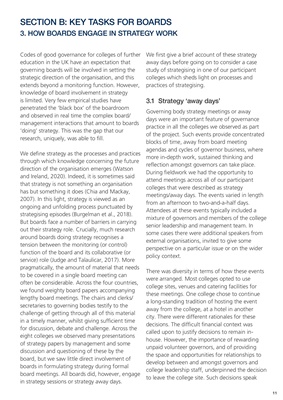
11
Codes of good governance for colleges of further
education in the UK have an expectation that
governing boards will be involved in setting the
strategic direction of the organisation, and this
extends beyond a monitoring function. However,
knowledge of board involvement in strategy
is limited. Very few empirical studies have
penetrated the 'black box' of the boardroom
and observed in real time the complex board/
management interactions that amount to boards
'doing' strategy. This was the gap that our
research, uniquely, was able to fill.
We define strategy as the processes and practices
through which knowledge concerning the future
direction of the organisation emerges (Watson
and Ireland, 2020). Indeed, it is sometimes said
that strategy is not something an organisation
has but something it does (Chia and Mackay,
2007). In this light, strategy is viewed as an
ongoing and unfolding process punctuated by
strategising episodes (Burgelman et al., 2018).
But boards face a number of barriers in carrying
out their strategy role. Crucially, much research
around boards doing strategy recognises a
tension between the monitoring (or control)
function of the board and its collaborative (or
service) role (Judge and Talaulicar, 2017). More
pragmatically, the amount of material that needs
to be covered in a single board meeting can
often be considerable. Across the four countries,
we found weighty board papers accompanying
lengthy board meetings. The chairs and clerks/
secretaries to governing bodies testify to the
challenge of getting through all of this material
in a timely manner, whilst giving sufficient time
for discussion, debate and challenge. Across the
eight colleges we observed many presentations
of strategy papers by management and some
discussion and questioning of these by the
board, but we saw little direct involvement of
boards in formulating strategy during formal
board meetings. All boards did, however, engage
in strategy sessions or strategy away days.
We first give a brief account of these strategy
away days before going on to consider a case
study of strategising in one of our participant
colleges which sheds light on processes and
practices of strategising.
3.1��Strategy�'away�days'
Governing body strategy meetings or away
days were an important feature of governance
practice in all the colleges we observed as part
of the project. Such events provide concentrated
blocks of time, away from board meeting
agendas and cycles of governor business, where
more in-depth work, sustained thinking and
reflection amongst governors can take place.
During fieldwork we had the opportunity to
attend meetings across all of our participant
colleges that were described as strategy
meetings/away days. The events varied in length
from an afternoon to two-and-a-half days.
Attendees at these events typically included a
mixture of governors and members of the college
senior leadership and management team. In
some cases there were additional speakers from
external organisations, invited to give some
perspective on a particular issue or on the wider
policy context.
There was diversity in terms of how these events
were arranged. Most colleges opted to use
college sites, venues and catering facilities for
these meetings. One college chose to continue
a long-standing tradition of hosting the event
away from the college, at a hotel in another
city. There were different rationales for these
decisions. The difficult financial context was
called upon to justify decisions to remain inhouse. However, the importance of rewarding
unpaid volunteer governors, and of providing
the space and opportunities for relationships to
develop between and amongst governors and
college leadership staff, underpinned the decision
to leave the college site. Such decisions speak
SECTION B: KEY TASKS FOR BOARDS
3. HOW BOARDS ENGAGE IN STRATEGY WORK